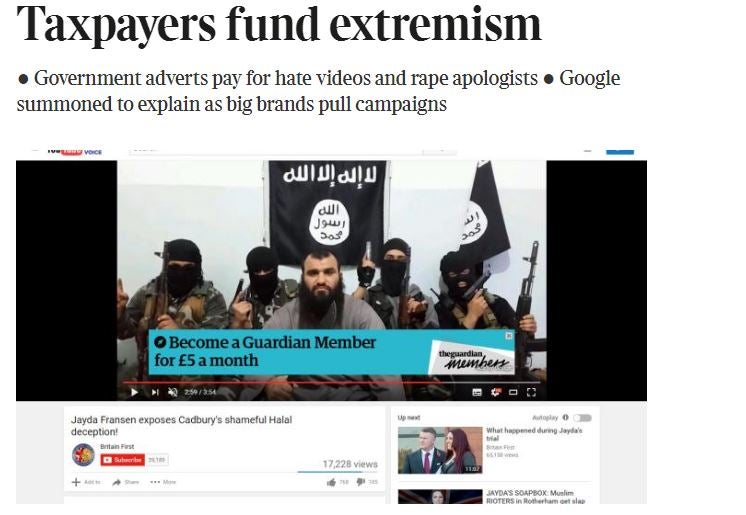
Google has been asked by the UK Government to explain why taxpayer-funded adverts are appearing alongside extremist material on its Youtube video platform.
The Guardian has also suspended advertising on Youtube after The Times found its membership offer appearing on a video for the far right group Britain First.
The Cabinet Office said it has placed a temporary restriction on its Youtube advertising “pending reassurances from Google that Government messages can be delivered in a safe and appropriate way”.
Global brands are said to have joined the Cabinet Office in pulling advertising from the internet giant, a Times investigation reported.
Rape apologists, anti-Semites and hate preachers were receiving payouts from publicly subsidised adverts on the Google-run video platform YouTube, according to the newspaper.
A Government spokesperson said: “Digital advertising is a cost-effective way for the Government to engage millions of people in vital campaigns such as military recruitment and blood donation.
“Google is responsible for ensuring the high standards applied to Government advertising are adhered to and that adverts do not appear alongside inappropriate content.
“We have placed a temporary restriction on our YouTube advertising pending reassurances from Google that Government messages can be delivered in a safe and appropriate way.
“Google has been summoned for discussions at the Cabinet Office to explain how it will deliver the high quality of service Government demands on behalf of the taxpayer.”
The Guardian has also withdrawn all its online advertising from Google and YouTube after it emerged that its ads were being placed next to extremist material.
Channel 4 said it was not satisfied that the platform was “a safe environment”.
David Pemsel, the Guardian’s chief executive, wrote to Google to say that it was “completely unacceptable” for its advertising to be misused in this way, the newspaper reported.
A Google spokesperson said: “We have strict guidelines that define where Google ads should appear, and in the vast majority of cases, our policies work as intended, protecting users and advertisers from harmful or inappropriate content.
“We accept that we don’t always get it right, and that sometimes, ads appear where they should not. We’re committed to doing better, and will make changes to our policies and brand controls for advertisers.”
Email pged@pressgazette.co.uk to point out mistakes, provide story tips or send in a letter for publication on our "Letters Page" blog
